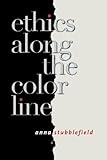Ethics along the Color Line / Anna Stubblefield.
Material type: TextPublisher: Ithaca, NY : Cornell University Press, [2018]Copyright date: ©2005Description: 1 online resource (210 p.)Content type:
TextPublisher: Ithaca, NY : Cornell University Press, [2018]Copyright date: ©2005Description: 1 online resource (210 p.)Content type: - 9781501717703
- 305.8
- HT1521
- online - DeGruyter
| Item type | Current library | Call number | URL | Status | Notes | Barcode | |
|---|---|---|---|---|---|---|---|
 eBook
eBook
|
Biblioteca "Angelicum" Pont. Univ. S.Tommaso d'Aquino Nuvola online | online - DeGruyter (Browse shelf(Opens below)) | Online access | Not for loan (Accesso limitato) | Accesso per gli utenti autorizzati / Access for authorized users | (dgr)9781501717703 |
Frontmatter -- Contents -- Acknowledgnents -- Introduction -- 1.History In Black: The Construction Of Black Identity And White Supremacy -- 2.Does The Reality Of Race Really Matter? -- 3.Taking Race Into Account -- 4.Anti-Black Oppression And White Supremacy -- 5.Races As Families -- References -- Index
restricted access online access with authorization star
http://purl.org/coar/access_right/c_16ec
What is "race"? What role, if any, should race play in our moral obligations to others and to ourselves? Ethics along the Color Line addresses the question of whether black Americans should think of each other as members of an extended racial family and base their treatment of each other on this consideration, or eschew racial identity and envision the day when people do not think in terms of race. Anna Stubblefield suggests furthermore that white Americans should consider the same issues. She argues, finally, that for both black and white Americans, thinking of races as families is crucial in helping to combat anti-black oppression.Stubblefield is concerned that the philosophical debate—argued notably between Kwame Anthony Appiah and Lucius Outlaw—over whether or not we should strongly identify in terms of race, and whether or not we should take race into account when we decide how to treat each other, has stalled. Drawing on black feminist scholarship about the moral importance of thinking and acting in terms of community and extended family, the author finds that strong racial identification, if based on appropriate ideals, is morally sound and even necessary to end white supremacy.
Mode of access: Internet via World Wide Web.
In English.
Description based on online resource; title from PDF title page (publisher's Web site, viewed 26. Apr 2024)


